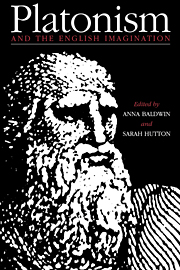Book contents
- Frontmatter
- Contents
- Notes on contributors
- Preface
- I ANTIQUITY
- II THE EARLY CHRISTIAN PERIOD AND THE MIDDLE AGES
- III THE RENAISSANCE AND THE SEVENTEENTH CENTURY
- IV THE EIGHTEENTH CENTURY
- V THE NINETEENTH CENTURY
- VI THE TWENTIETH CENTURY
- 24 Introduction
- 25 Yeats and Platonism
- 26 Virginia Woolf and Plato: the Platonic background of Jacob's Room
- 27 Plato and Eliot's earlier verse
- 28 The Cantos of Ezra Pound: ‘to build light’
- 29 Platonism in Auden
- 30 Platonism in Iris Murdoch
- Bibliography
- Index
30 - Platonism in Iris Murdoch
Published online by Cambridge University Press: 15 December 2009
- Frontmatter
- Contents
- Notes on contributors
- Preface
- I ANTIQUITY
- II THE EARLY CHRISTIAN PERIOD AND THE MIDDLE AGES
- III THE RENAISSANCE AND THE SEVENTEENTH CENTURY
- IV THE EIGHTEENTH CENTURY
- V THE NINETEENTH CENTURY
- VI THE TWENTIETH CENTURY
- 24 Introduction
- 25 Yeats and Platonism
- 26 Virginia Woolf and Plato: the Platonic background of Jacob's Room
- 27 Plato and Eliot's earlier verse
- 28 The Cantos of Ezra Pound: ‘to build light’
- 29 Platonism in Auden
- 30 Platonism in Iris Murdoch
- Bibliography
- Index
Summary
Iris Murdoch poses two questions that link her intimately to Plato:what is goodness or what is a good man like? And what is the place of love and desire within the quest for goodness? These questions recur throughout her twenty-four (to date) novels and her few, sometimes slender and yet very influential works of moral philosophy. The nature of goodness and its relationship with love: these are preoccupations in her philosophy and her fiction alike.
The West owes to Plato the invention of the soul, and thus also the idea of morality as aspiration. Just as Plato's picture of man as possessing a soul was a revolutionary one, so to argue for the soul today has once again become a radical move. Unlike Plato, Murdoch certainly does not wish to argue for the soul's immortality: rather she wishes to insist that human life concerns a mysterious battle between good and evil, and that we are essentially spiritual beings.
This distinguishes her from other twentieth-century writers who are Plato-haunted. The Modernists – Eliot, Pound, Yeats – often turn to Plato for an aesthetic rationale. They variously find in Plato ways of under-writing the authority of the separate and other-worldly realm of art. Art is to occupy a zone beyond either history, contingency or messy individuality, and beyond, indeed, democracy too. The Modernists and Symbolists ‘refuse to conceive of perfection in human terms’;which is to say that they seek to redeem the horrors of contingency – of chance and necessity, or, as a Neoplatonist might put it, of multiplicity – through a resort to myth and symbol.
- Type
- Chapter
- Information
- Platonism and the English Imagination , pp. 330 - 342Publisher: Cambridge University PressPrint publication year: 1994
- 2
- Cited by



